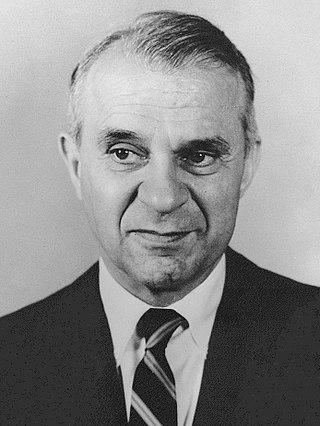The Austrian School is a heterodox school of economic thought that advocates strict adherence to methodological individualism, the concept that social phenomena result exclusively from the motivations and actions of individuals. Austrian school theorists hold that economic theory should be exclusively derived from basic principles of human action.

James Joseph Heckman is a Nobel Memorial in Economic Sciences Prize-winning American economist at the University of Chicago, where he is The Henry Schultz Distinguished Service Professor in Economics and the College; Professor at the Harris School of Public Policy; Director of the Center for the Economics of Human Development (CEHD); and Co-Director of Human Capital and Economic Opportunity (HCEO) Global Working Group. He is also Professor of Law at the Law School, a senior research fellow at the American Bar Foundation, and a research associate at the National Bureau of Economic Research. In 2000, Heckman shared the Nobel Memorial Prize in Economic Sciences with Daniel McFadden, for his pioneering work in econometrics and microeconomics. As of December 2020, according to RePEc, he is the second-most influential economist in the world.
Development economics is a branch of economics which deals with economic aspects of the development process in low- and middle- income countries. Its focus is not only on methods of promoting economic development, economic growth and structural change but also on improving the potential for the mass of the population, for example, through health, education and workplace conditions, whether through public or private channels.
Frank Hyneman Knight was an American economist who spent most of his career at the University of Chicago, where he became one of the founders of the Chicago School. Nobel laureates Milton Friedman, George Stigler and James M. Buchanan were all students of Knight at Chicago. Ronald Coase said that Knight, without teaching him, was a major influence on his thinking. F.A. Hayek considered Knight to be one of the major figures in preserving and promoting classical liberal thought in the twentieth century. Paul Samuelson named Knight as one of the several "American saints in economics" born after 1860.

Simon Smith Kuznets was an American economist and statistician who received the 1971 Nobel Memorial Prize in Economic Sciences "for his empirically founded interpretation of economic growth which has led to new and deepened insight into the economic and social structure and process of development."

Wassily Wassilyevich Leontief, was a Soviet-American economist known for his research on input–output analysis and how changes in one economic sector may affect other sectors.
Computational Economics is an interdisciplinary research discipline that involves computer science, economics, and management science. This subject encompasses computational modeling of economic systems. Some of these areas are unique, while others established areas of economics by allowing robust data analytics and solutions of problems that would be arduous to research without computers and associated numerical methods.

Justin Yifu Lin is a Chinese economist and professor of economics at Peking University. He served as the Chief Economist and Senior Vice President of the World Bank from 2008 to 2012. He has been appointed as China State Council Counsellor since September 2013.
Regional economics is a sub-discipline of economics and is often regarded as one of the fields of the social sciences. It addresses the economic aspect of the regional problems that are spatially analyzable so that theoretical or policy implications can be the derived with respect to regions whose geographical scope ranges from local to global areas.
Applied economics is the study as regards the application of economic theory and econometrics in specific settings. As one of the two sets of fields of economics, it is typically characterized by the application of the core, i.e. economic theory and econometrics to address practical issues in a range of fields including demographic economics, labour economics, business economics, industrial organization, agricultural economics, development economics, education economics, engineering economics, financial economics, health economics, monetary economics, public economics, and economic history. From the perspective of economic development, the purpose of applied economics is to enhance the quality of business practices and national policy making.

The German Institute for Economic Research, or, more commonly DIW Berlin, is a economic research institute in Germany, involved in basic research and policy advice. It is a non-profit academic institution, financed with public grants from the Berlin Senate Department for Economics, Technology and Research and the Federal Department for Economics and Technology. DIW Berlin was founded in 1925 as the Institute for Business Cycle Research and was later renamed.
The Journal of Political Economy is a monthly peer-reviewed academic journal published by the University of Chicago Press. Established by James Laurence Laughlin in 1892, it covers both theoretical and empirical economics. In the past, the journal published quarterly from its introduction through 1905, ten issues per volume from 1906 through 1921, and bimonthly from 1922 through 2019. The editor-in-chief is Magne Mogstad.
Institutional analysis is that part of the social sciences which studies how institutions—i.e., structures and mechanisms of social order and cooperation governing the behavior of two or more individuals—behave and function according to both empirical rules and also theoretical rules. This field deals with how individuals and groups construct institutions, how institutions function in practice, and the effects of institutions on each other, on individuals, societies and the community at large.
Cultural economics is the branch of economics that studies the relation of culture to economic outcomes. Here, 'culture' is defined by shared beliefs and preferences of respective groups. Programmatic issues include whether and how much culture matters as to economic outcomes and what its relation is to institutions. As a growing field in behavioral economics, the role of culture in economic behavior is increasingly being demonstrated to cause significant differentials in decision-making and the management and valuation of assets.

Sociology is a social science that focuses on society, human social behavior, patterns of social relationships, social interaction, and aspects of culture associated with everyday life. It uses various methods of empirical investigation and critical analysis to develop a body of knowledge about social order and social change. While some sociologists conduct research that may be applied directly to social policy and welfare, others focus primarily on refining the theoretical understanding of social processes and phenomenological method. Subject matter can range from micro-level analyses of society to macro-level analyses.
Economic Geography is a peer-reviewed academic journal published quarterly by Taylor & Francis on behalf of Clark University. The journal was established in 1925 and is currently edited by James T. Murphy, Jane Pollard, Andrés Rodríguez-Pose, and Henry Wai-chung Yeung.
Berthold Frank Hoselitz (1913–1995) taught Economics and Social Science at the University of Chicago between 1945 and 1978. His analysis of the role of cultural and sociological factors in economic development was influential and contrasted to Chicago School models of self-interested maximizing behavior. Hoselitz was the founding editor of Economic Development and Cultural Change, a prominent journal in the new research field of economic development. At the Carnegie Institute of Technology Hoselitz taught a course in international economics in 1947–48 that was the only economics course that future Nobel Laureate John Nash took before Nash wrote his pathbreaking thesis on game theory and bargaining.
Eleonora Patacchini is an economist specializing in applied economics and applied statistics who grew up in Italy with her mother who was also a professor. She is a professor and associate department chair at Cornell University in the Department of Economics. Her research focuses on the empirical analysis of behavioral models of strategic interactions for decision making. Patacchini is an associate editor at Journal of Urban Economics and Statistical Methods & Applications. She is a columnist at the VOX CEPR Policy Portal where research-based policy analysis and commentary from leading economists are published frequently. She is also a co-editor of E-journal Economics and associate editor of the Journal of Urban Economics.
Yves Zenou is a French-Swedish economist. He is a professor at Monash University and holds the Richard Snape Chair in Business and Economics.






